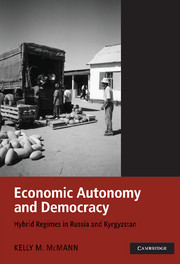Book contents
- Frontmatter
- Contents
- List of Figures
- List of Tables
- Acknowledgments
- Notes on Transliteration
- Economic Autonomy and Democracy
- 1 Capitalism, Democracy, and Economic Autonomy
- 2 The Concept of Economic Autonomy
- 3 Measurement of Democracy
- 4 Activism under the State's Thumb
- 5 Illustrations of Economic Autonomy
- 6 Hybrid Regimes
- Appendix A Description of Surveys
- Appendix B Alternative Explanations
- Appendix C List of Interviews
- Appendix D Measurement of Eight Guarantees of Democracy
- References
- Index
6 - Hybrid Regimes
Published online by Cambridge University Press: 01 September 2009
- Frontmatter
- Contents
- List of Figures
- List of Tables
- Acknowledgments
- Notes on Transliteration
- Economic Autonomy and Democracy
- 1 Capitalism, Democracy, and Economic Autonomy
- 2 The Concept of Economic Autonomy
- 3 Measurement of Democracy
- 4 Activism under the State's Thumb
- 5 Illustrations of Economic Autonomy
- 6 Hybrid Regimes
- Appendix A Description of Surveys
- Appendix B Alternative Explanations
- Appendix C List of Interviews
- Appendix D Measurement of Eight Guarantees of Democracy
- References
- Index
Summary
The third wave of democratization – beginning in 1974 with a military coup in Portugal and washing over much of Latin America, Asia, Africa, and the Eastern bloc during the next two decades – raised expectations among scholars, activists, and journalists that democracy would flourish in regions outside of Western Europe and North America. Political leaders in third wave countries had circumvented socioeconomic conditions not conducive to democratic development by opting to dismantle old regimes and craft new political institutions. Yet, in the 21st century, our euphoria over these extractions from authoritarianism has dissipated as many of these new governments have shown themselves to be hybrid regimes; in other words, they combine elements of democracy and authoritarianism. Nearly half of all countries worldwide can be characterized as having hybrid regimes. Typically, these regimes hold elections without guaranteeing the civil liberties that make electoral outcomes accurate expressions of citizens' preferences.
Why have hybrid regimes proliferated? The concept of economic autonomy and the model of interaction developed in this book offer some clues. Interventionist states had developed in many of the third wave countries by the time democratic institutions were introduced there. The emergence of interventionist states robbed citizens of their economic autonomy and thus enabled governments to more easily harass their opponents. The interaction among components of democracy compounded the problem by allowing government officials to undermine entire nascent democracies through the restriction of only a few civil liberties.
- Type
- Chapter
- Information
- Economic Autonomy and DemocracyHybrid Regimes in Russia and Kyrgyzstan, pp. 174 - 184Publisher: Cambridge University PressPrint publication year: 2006



